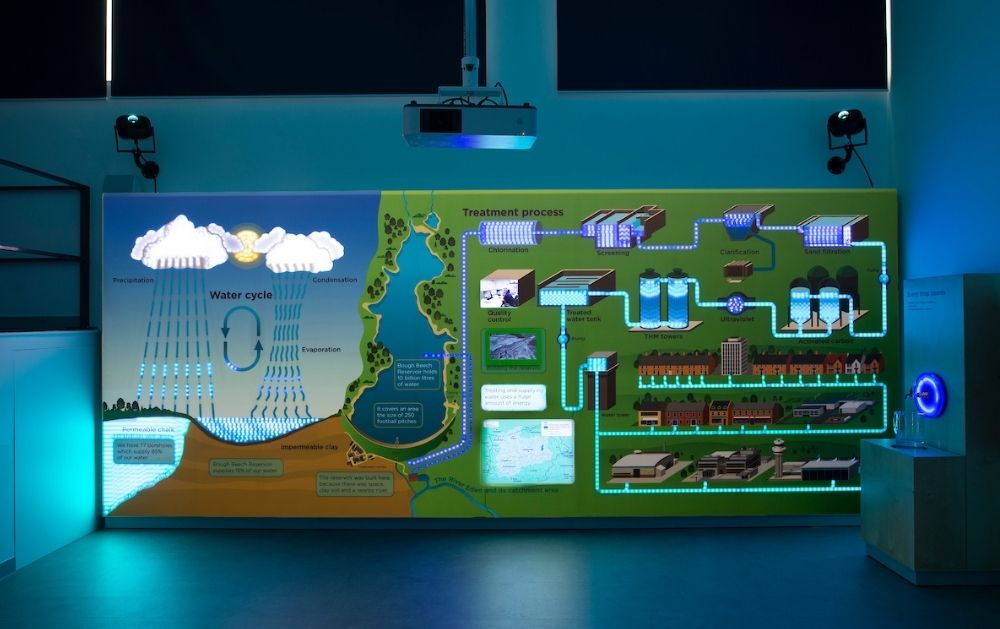Meet Lisa, our amazing Education Coordinator

05 November 2025
Did you know that SES Water has a dedicated education centre, the Flow Zone? Helping the next generation understand about where water comes from, why it’s important and how to take care of it is something we care about a lot.
Lisa is the Education Coordinator at the Flow Zone. We asked Lisa a few questions to find out more about this fantastic resource.
1. What was your route into this role?
I was a primary school teacher for 28 years before this role. This job allows me to continue to teach and make a difference to children’s lives but not have any of the not-so-nice parts of teaching – marking books, parents evenings and Ofsted Inspections to name just a few! I enjoy meeting lots of different teachers and pupils, being outside in the fresh air and watching how the landscape changes across the seasons.
2. Why is it important for today’s children to know about the water system?
Children can take clean water for granted because they are accustomed to having it readily available without having to spend hours collecting it or worrying about its safety.
At our education centre, the Flow Zone, we talk about water inequality and how children in other parts of the world have to collect their water from rivers that are often contaminated with bacteria that could make them very unwell, but they have no other choice than to use this water.
In the Blue Zone part of the Flow Zone, the children carry a bucket with 10L of water inside across the room to see what this must feel like have to carry a heavy bucket of water.
Secondary pupils who are studying the GCSE Chemistry topic – Potable Water can see a real-world application of how filtration and chlorination are used to purify water and revisit learning about the water cycle, which secondary teachers say is a huge benefit.
As a result of learning to be water efficient, children are creating lifelong habits and awareness that helps to conserve water. It teaches them a sense of responsibility for protecting the environment. It helps them appreciate that water is a limited resource affected by climate change and population growth.
3. What do your lessons cover?
Our lessons cover the water cycle, the geography of the local area, the history of the reservoir, water safety, how SES Water makes water clean and safe for our customers by using different treatment processes and how we can be more water efficient.
4. How do you make learning about water fun?
Flow Zone is an interactive education centre. We have a display which lights up and makes sounds which we use at the start of the visit to engage and excite the children. This introduces them to the water cycle and the different treatment processes that we use at Bough Beech Treatment Works.
There are interesting displays for the children to learn from and engage with in the centre and in Blue Zone there are ‘hands on’ activities which teach the children how to be water savers and not water wasters. We bring learning to life by walking up the dam and around the reservoir. They look at the overflow, the valve tower and walk down a tunnel which leads them to stand underneath the reservoir. They tour the treatment works and see firsthand the different treatment processes.
5. What kind of things do pupils want to know about?
Our visitors are always curious and ask lots of questions as we conduct our visit. They ask about the wildlife we see at Bough Beech, whether they can swim in the reservoir (the answer is no!), what happens to the fish that they see in the screens, what would happen if they fell into the overflow and what would happen if the pipe in the tunnel were to burst!
7. What’s a common misunderstanding children have about water?
Our visitors are often very surprised at the length of time it takes for the reservoir water to pass through all the treatment processes and end up clean and safe to drink. When asked to guess, this can range from 2 years to 2 days. The actual time that it takes is 4 hours.
8. If someone wanted to help their children learn about water at home, what could they do?
Exploring the topic of water has endless possibilities - change of state, floating and sinking, sources of water, water safety, water pollution. Here at Flow Zone, we ask our visitors to be water ambassadors and share the different ways they have learnt about how to save water with family and friends and explore other ways too.
As a starting point, we give them a 4-minute shower timer to take home to put in their bathroom to encourage everyone to have a shorter shower. We encourage them to report leaking taps or dripping showers that waste 3L of water a day and to make sure that everyone at home is turning off the tap when they are brushing their teeth. Water conservation should be a familiar concept at home and adults should be positive role models and lead by example.
For a video showing the Flow Zone and details of how to book a session, visit our Flow Zone page.
